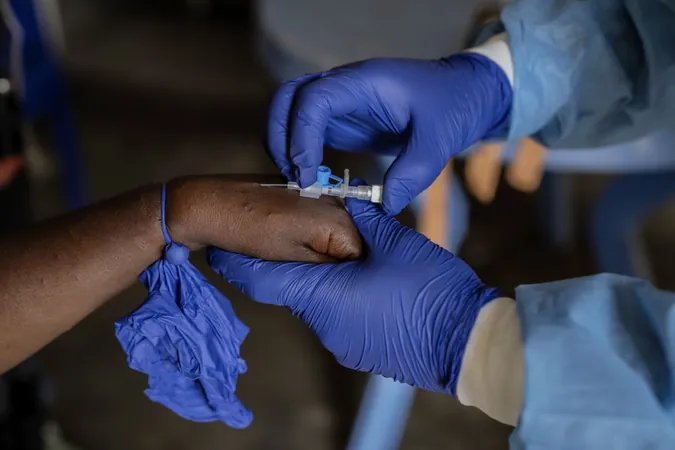
WHO Reports Potential Plateau of Mpox Cases in Congo Amid Ongoing Outbreaks in the Region
2024-11-11
Author: Olivia
Potential Plateau of Mpox Cases in South Kivu
LONDON (AP) — The World Health Organization (WHO) has indicated that mpox cases in South Kivu, the Congolese region where a new, more infectious variant was first identified, may be 'plateauing'. Meanwhile, infections are rising in other parts of the Democratic Republic of Congo, as well as in neighboring countries such as Burundi and Uganda.
Stabilization in South Kivu
According to a report from the WHO, while mpox infections are on an upward trend nationwide, South Kivu appears to have stabilized. This area, particularly Kamituga—a gold mining town—has been a hotspot for the spread of the virus, initially among local sex workers and miners, since earlier this year.
Challenges in Testing
Despite these promising signs, the WHO notes that widespread testing remains a significant challenge, complicating efforts to fully grasp how the virus is propagating. Last week, Congo reported fewer than 100 laboratory-confirmed mpox cases, a sharp decline from approximately 400 cases in July. Experts suggest that this decrease may present a crucial opportunity for health authorities to effectively eliminate the outbreak.
Vaccination Efforts
Currently, about 50,000 individuals in Congo have received mpox vaccinations. However, the Africa Centers for Disease Control and Prevention warns that at least 3 million vaccines are required to effectively control the epidemic across the continent. The director of the Africa CDC, Dr. Jean Kaseya, stated that Africa is still experiencing the acute phase of the mpox epidemic, with 19 countries reporting cases.
Surge in Burundi and Uganda
Burundi has seen a surge in mpox cases fueled by the newer variant, which tends to produce milder symptoms. Consequently, many infectious individuals may unknowingly contribute to the spread. The country has recorded over 200 new mpox cases weekly, predominantly among children and young adults. Uganda is also grappling with the disease, reporting 100 new cases recently, primarily transmitted through sexual contact among adults.
Understanding Mpox
Mpox, previously recognized as monkeypox due to its origin in research monkeys, is spread mainly through close skin-to-skin interaction with infected individuals or contaminated clothing and bedding. The disease often leads to visible skin lesions, which can deter social interactions and increase isolation.
Global Health Emergency Declaration
In August, WHO declared the rapid mpox spread in Congo and across Africa a global health emergency. To date, there have been more than 46,000 suspected cases reported in Africa, resulting in at least 1,081 deaths. In a significant development, WHO has scheduled an expert meeting for November 22 to review whether mpox still constitutes an international emergency.
Emerging Cases in the UK
Adding to global concerns, the UK recently confirmed its first cases of the more infectious mpox variant outside of Africa. These infections were identified in a traveler who returned from Africa and spread to three household members; all patients are currently receiving treatment in two hospitals in London.
Urgency for Intervention
As the world watches these developments, the urgency for effective intervention and increased vaccination efforts remains at an all-time high. The battle against mpox is far from over, and global health authorities are mobilized to prevent further spread.









 Brasil (PT)
Brasil (PT)
 Canada (EN)
Canada (EN)
 Chile (ES)
Chile (ES)
 España (ES)
España (ES)
 France (FR)
France (FR)
 Hong Kong (EN)
Hong Kong (EN)
 Italia (IT)
Italia (IT)
 日本 (JA)
日本 (JA)
 Magyarország (HU)
Magyarország (HU)
 Norge (NO)
Norge (NO)
 Polska (PL)
Polska (PL)
 Schweiz (DE)
Schweiz (DE)
 Singapore (EN)
Singapore (EN)
 Sverige (SV)
Sverige (SV)
 Suomi (FI)
Suomi (FI)
 Türkiye (TR)
Türkiye (TR)